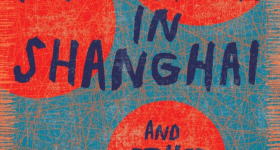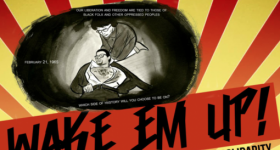Jackie Chan is martial arts master to Jaden Smith in the new Karate Kid.
Aly Morita contacted me the other day about publicizing her call for a boycott of the remake of the Karate Kid, saying it’s another example of Hollywood perpetuating stereotypes about Asian Americans.
It was right after I started seeing commercials for the new movie that made me wonder how Asians (it’s set in China) and Asian Americans would be portrayed, so it was good timing. I gave Aly a call to find out why she wanted a boycott.
The remake has blockbuster written all over it. Will Smith and Jada Pinkett Smith are among the producers of the new movie and it stars their son, Jaden, as the young martial arts student. Jackie Chan plays the wise mentor, updating the iconic and Oscar-nominated Mr. Miyagi role played by Aly’s father, Pat, 25 years ago in the original film.
Aly, who wrote about her relationship with her dad in the Inside/Out Issue of Hyphen, told me she’s aware that she’s criticizing a film that stars two actors of color, which is a rarity. And she’s aware that she opens herself up to criticism by passing judgment on something she hasn’t seen.
“All I’m asking is they not pay to see it in a movie theater, wait for the DVD or Netflix,” she said of her Facebook boycott page. “Be conscious of where the money is going.”
That would be Hollywood, which many would agree hasn’t given Asian American actors many good roles, or many roles at all, and hasn’t moved much beyond kung fu imagery created for characters such as Mr. Miyagi.
"Growing up, I always struggled with fact that my father played Mr. Miyagi as my own identity politics started to form,” she said. “I’ve come to my own personal peace with it.”
But she says not much has changed since her dad taught Ralph Macchio to “wax on” and “wax off.”
“It’s been 25 years since the original came out, and we’re still dealing with the same stereotypes,” Aly said. “Where are the other roles for Asian American actors? Why is the karate master the one role that people can respond to?”
The original Karate Kid movies, despite the stereotyping, were a step forward.
“For anyone that grew up during that time period, finally there was a movie starring an Asian American actor,” Aly said. “It had a good 10-year lifespan, and I think for a lot of Asian Americans, even those who had problems with the character of Mr. Miyagi, it was like, ‘Wow, I could star in a film if I was Asian American.’ I think it was very inspiring for a lot of people. We haven’t had that in some time.”
Of course, boycotting the movie doesn't allow you to judge it on its merits. Aly's protest is more about the entertainment industry than it is about the Karate Kid remake. Like she says, we’ve been complaining about Hollywood for years with not much to show for it.
Whether it’s a boycott or blogging about it, she says the only way Hollywood imagery of Asian Americans will change is if people inform themselves about the issue and speak out.
“I don’t know, maybe we should boycott every movie that’s not representative of who we are as people,” she said. “That remains very frustrating because it’s 25 years later.”
So, will you boycott Karate Kid?










Comments
Here's an 8asians article that is on the other side of the fence when it comes to this remake:
http://www.8asians.com/2010/06/10/my-thoughts-on-the-karate-kid-remake/
Thanks, Edward. I had meant to link to your story (it's added now). Great piece.
I'm with Aly Morita on her criticisms of Hollywood and the way it treats Asian America, but she's blowing hot air about this film until she sees it.
I was lucky to see a free advance screening, and here's what I saw:
1) For the first time, Jackie Chan appears in a Hollywood movie in which I don't feel embarrassed for him.
2) This is a major Hollywood production, a family-centered summer blockbuster action flick aimed at kids, in which NONE of the important characters is white.
3) American kids are being asked to identify with a character who is a black kid. In other words, a non-white character is allowed to be the sole representative of America and Americanness in a major mainstream movie.
4) The experience of being American is shown not as one of privilege but one of being a vulnerable foreigner. I suppose one could call it a case of wishful underdog-ism, but I also saw it as an interesting twist on immigration.
5) The movie allows for a positive portrayal of African Americans to a Chinese audience, as well as a multifaceted portrayal of Chinese society to American audiences.
Yes, the title is obviously crass marketing. There's really no excuse for that, but the movie itself clearly makes distinctions between kung fu and karate.
Yes, moving the setting to China was probably motivated by dollar signs. But I think the setting and the need to work with Chinese producers and censors actually resulted in Asian characters with more dignity than Hollywood normally allows them. I'm not for Chinese state censorship at all; it's just that, in this instance, it obviously inspired the filmmakers to be as respectful as possible.
And yes, nepotism is annoying and the Smith kid is often insufferable. But he obviously works hard in this movie and is less annoying than a lot of child actors in family movies.
Whether you find it good, bad, or indifferent, Asian Americans are almost completely irrelevant to this film, except for one brief scene in which the movie clearly shows that Asians and Asian Americans are not interchangeable.
The movie isn't perfect, and it doesn't avoid all stereotypes. But the stereotypes that are there are mostly kung fu related (mystifying kung fu, good vs. evil characters, etc.) and nothing that we haven't also seen in Chinese-made movies about kung fu. For the genre of movie that it is, it does an above-average job of being respectful all around.
I saw it with a group that was mostly African American martial artists, and we all enjoyed the movie. I was surprised at my own enjoyment, since I was fully prepared to hate the movie. I would go so far as to say that, if I had a child, I would take her to see this movie without much in the way of reservations, which I couldn't say about the original movie.
So while the movie is certainly not immune to criticism, Morita's claim that the movie perpetuates stereotypes about Asian Americans is so off-base as to be ridiculous. It's this kind of uninformed knee-jerk reaction that makes it so easy for people to dismiss Asian American critiques of media portrayals as meaningless whining.
I was looking forward to taking my boys to see this movie, but now I may have to think twice. While I sympathize with Morita and the effect the Karate Kid franchise had on her father (and the enduring wax on, wax off jokes the rest of us Asians had to hear for the better part of the 80s) there are so few options from mainstream Hollywood that even acknowledge Asians. This one, for the most part, seems well-done and suitable for young-ish kids.
Maybe I'll go screen it first.
http://hapamama.com/2010/06/will-you-let-your-kids-see-karate/
Please take a look at this link to a post I wrote for You Offend Me You Offend My Family. It gives a more intimate, personal account of where I am coming from.
http://youoffendmeyouoffendmyfamily.com/the-heart-and-soul-of-the-karate...
I'm not sure why you would boycott this particular movie over others? I think, if we boycott any movies for not giving Asian Americans a chance, it's films that depict Asian American culture or films that are diverse with exception to the Asian American group. Boycotting a movie for including Asian Americans in a role that's already familiar without necessarily providing a negative stereotype is unproductive.
I'm with sgpark on this. I saw it - with reservations - with my wife and 9 year old son. We thought it was really entertaining and have recommended it to others. the only other things I might add:
1) the fact that this MAJOR Hollywood production has no Anglos in it is a HUGE step forward - the few scenes with Anglos are few and practically disapear about midway in the film.
2) yes, there are Asians who practice kung fu in the film, but there are also lots who do not
My family is part of the Last Airbender boycott and believe that Hollywood needs to be reminded that racist casting is not OK. This is not that film. Hollywood should be praised when it actually does a decent - albeit not perfect - job.
I was the first to boycott the karate kid and my blog proves it, quit trying to steal my Aly. MY reasons for Boycott our real reasons, that all people can boycott for. check it out
1.Chinese WuShu is not Karate
2.It's a complete distortion of the fact of who are the bullies+thugs and who are the victims
My partner Jen saw the movie opening weekend (sorry) with her mom, and here is their review:
http://disgrasian.com/2010/06/disgrasian-of-the-weak-liveblogging-the-ka...
That was hilarious.
Thanks, Diana.
This film should be boycotted. Its just another film where a non-asian learns martial arts and ends up being better than the other asians and non-asian wins heart of asian girl. TA-DA yellow fever!!! Haven't we had enough of this sterotypical BS where asian man always loses to a non-asian. All of you supporting this film should be ashamed of yourselves. Im not watching this crap film and I'm telling my friends and other asians not to watch it also.
Aly expresses a concern that her father will be forgotten. Mr. Miyagi was an iconic, positive figure in a time when Long Duk Dong was the other major Asian image. Pat Morita will never be forgotten as a trailblazer, icon, and role model for Asian Americans, the same way George Takei will never be forgotten for the immense impact he had among Asian American youth by playing Sulu, despite the multiple derivative Star Trek television series that followed, or the recent Star Trek remake.
In the grand scheme, I don’t have a problem with this remake relative to other movies. This remake takes an iconic movie and changes the cast to almost all non-white characters, and places the story in Asia. I’m more offended by the Whitewashing of real or fictional Asian characters, including recent films like 21, Extraordinary Measures, Dragonball, Speed Racer, and Prince of Persia. Upcoming movies have Mickey Rourke playing Genghis Khan, Leonadro DiCaprio in an Akira remake, a Charlie Chan remake starring no Asian or Asian American male, and all the Asian characters and cultures have magically disappeared in The Last Airbender. There are also dozens of remakes of films made from Asia, such as The Departed, The Ring, The Grudge, Shall We Dance, The Eye, My Sassy Girl, The Lake House, and others, in which almost nothing is changed except for race. Even well-made movies like Forbidden Kingdom, still modify one of East Asia’s most celebrated classics (Journey to the West) into another White Knight/savior story along the same lines as Last Samurai, Dances with Wolves, Avatar, District9, and even The Blind Side. It is also disturbing that two of Asia’s biggest stars (Jackie Chan and Jet Li) had 2nd billing in that movie behind some random, unknown white actor nobody came to see.
Asians consumers in Asian theaters have no issues watching predominantly Hollywood-made films starring white faces, with subtitles, but the underlying, unstated justification behind all these Hollywood Whitewashing remakes is that (white) Americans won’t pay to see quality films with Asian or Asian American faces.